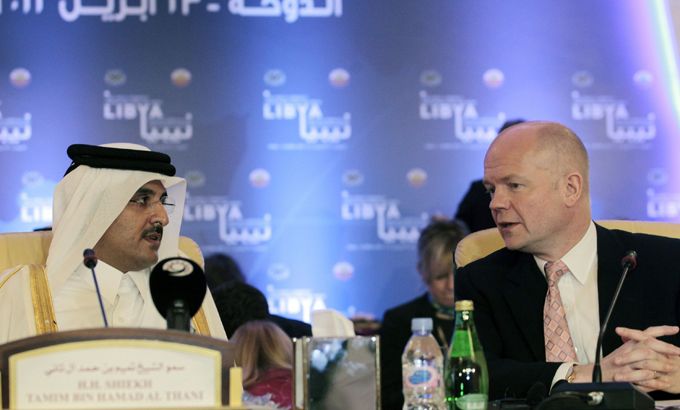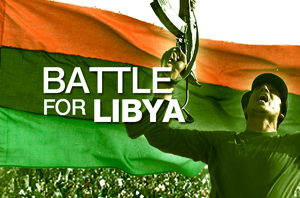Libya group agrees ‘trust fund’ for rebels
International contact group calls on Gaddafi to step down to “allow Libyan people to determine their own future”.

The international contact group on Libya has agreed to set up a temporary “trust fund” to help channel assets to the opposition Transitional National Council in Benghazi.
In a statement issued at the conclusion of Wednesday’s one-day summit in Doha, Qatar, the group united to call on Libya’s longterm leader Muammar Gaddafi to step down.
“Gaddafi and his regime has lost all legitimacy and he must leave power allowing the Libyan people to determine their own future,” the group said.
The financial mechanism being set up will allow international donations to be made directly available to Gaddafi’s opponents – possibly from frozen assets of the Gaddafi administration.
 |
| Click here for more on our special coverage |
The group warned that up to 3.6 million people in Libya could require humanitarian assistance as the result of weeks of fighting in the country.
Members of the group have called for more pressure to be exerted against Gaddafi’s regime, but they disagree on whether to arm the rebels seeking to eject him.
Al Jazeera correspondent James Bays said some participants had “deep concerns” about providing Libyan rebels, who are fighting to topple Gaddafi from power, with access to funds.
“I spoke to the German foreign minister [Guido Westerwelle] and he had concerns over whether it was legal or not,” our correspondent said.
“Statements from the UK and Qatar have agreed that the situation in Benghazi is urgent. And most is due to a lack of cash – it’s not all about heavy weapons for frontline fighters; it’s also about being able to pay public servants and getting schools back open.”
After the conference, Sheikh Hamad bin Jassim bin Jaber bin Muhammad Al Thani, Qatar’s prime minister, said that Gaddafi must step down.
“Those around him should advise him that it is in the best interests of Libya,” he said. “This is the ideal scenario, for the safety of everyone – including himself and his family.”
Sending weapons to Benghazi
The Qatari prime minister also didn’t rule out arming anti-Gaddafi rebels.
“Qatar starts by providing humanitarian supplies, including heating gas and other supplies. We have also taken 6,000 refugees. For all other needs, Qatar … will make things available for the Libyan people to defend themselves.”
William Hague, British foreign secretary, told Al Jazeera that arming Benghazi-based fighters would not be contrary to international law.
“The UN resolutions do allow for the provision of weapons,” he said. “But we are making our contribution through our own military, as well as providing non-lethal support, such as communications equipment.”
He earlier told reporters that “the arms embargo applies to all of Libya, but it is appropriate to equip people with what is needed to protect themselves”.
Franco Frattini, Italy’s foreign minister, went further.
“Gaddafi’s tactics are to put tanks in the streets – and we cannot have air strikes against people in the city streets, in the squares, in the highly populated areas,” he said.
“Either we make it possible for these people to defend themselves, or we withdraw our claims of support.”
However, in an apparent rift between EU partners on Libya, Steven Vanackere, the Belgian foreign minister earlier said his country was opposed to the idea.
“The UN resolution speaks about protecting civilians, not arming them,” he said.
Qatar ‘an oil corporation’
|
https://www.youtube.com/watch?v=Wc9SeXbRngs |
The Libyan government has dismissed the talks and Qatar’s role in the ongoing conflict.
“We are very hopeful that the American people and the American government will not buy into the Qatari lies and Qatari schemes,” a spokesman of the Libyan regime told reporters in Tripoli on Tuesday.
“Qatar is hardly a partner of any kind. It’s more of an oil corporation than a true nation,” the spokesman said.
Meanwhile, after visiting Greece, Malta and Turkey, Libyan foreign minister Abdelati Laabidi flew into Cyprus – as Gaddafi’s administration pressed a fresh diplomatic offensive among Mediterranean nations.
He was due to meet Cypriot counterpart Marcos Kyprianou on Thursday.
Laabidi was recently named to replace Moussa Koussa, who arrived in Qatar ahead of the Doha talks after fleeing to Britain last month. Koussa did not take part in the formal meeting, but was understood to have met with various officials on the sidelines of the conference.
Mustafa Gheriani, a media liaison official for the Libyan opposition, said Koussa was “not connected to the Transitional National Council in any way or shape”.
Gheriani added that he was personally surprised to learn that Koussa was leaving Britain to attend the Qatar talks, and suggested that British officials should explain why he was going and in what capacity.
‘Free individual
Koussa, the most prominent Libyan government defector, sought refuge in Britain on March 30. A friend said he quit in protest at attacks on civilians by Gaddafi’s forces.
The former spy chief was questioned by Scottish police over the 1988 Lockerbie airliner bombing, which killed 270 people, but the British government said he was now free to travel.
In his first public statement since arriving in Britain, Koussa told the BBC on Monday his country could become “a new Somalia” unless all sides involved in the conflict stopped it from descending into civil war.